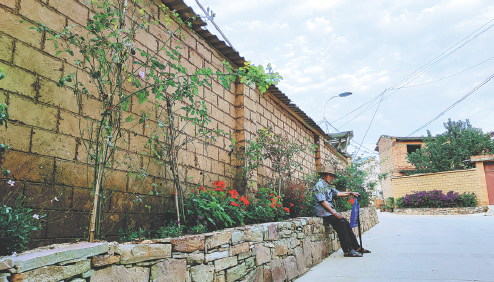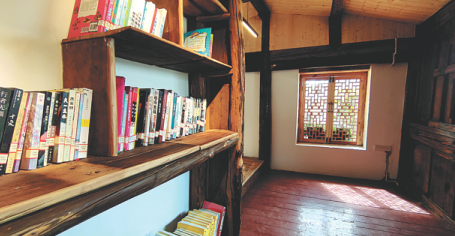
A villager takes a rest at the roadside of Yanta, listed last year as one of more than 250 beautiful leisure villages in the country with rich natural and folk resources that offer visitors diverse travel experiences.
With its pear orchards and ancient buildings, Yunnan's Yanta village is a model of rural vitalization, report Yang Feiyue in Beijing and Li Yingqing in Kunming.
Zhao Quankang was thrilled when Yanta village was named as a beautiful leisure location by the Ministry of Agriculture and Rural Affairs in November.
"It proves I made the right decision to come back," says the 25-year-old, who was born and grew up in the village that sits in the county-level city Anning, under the jurisdiction of Kunming, capital of Southwest China's Yunnan province.
Yanta is one of more than 250 beautiful leisure villages listed last year, all of which are deemed to have rich natural and folk resources, offer diverse travel experiences, a steady leisure and tourism income and well-developed tourism services.
Yanta is home to a population of about 1,100 villagers and boasts numerous pear orchards and an ancient temple. It has maintained most of its historical features.
Zhao had been paying close attention to the status of his home.
"During my childhood, Yanta village was very poor, and everyone seemed to just want to grow up and get out as soon as possible," Zhao recalls.
"The condition of the houses was wretched, and villagers relied on horses and tractors for transportation."
As soon as he graduated from Xi'an Aeronautical Institute in Shaanxi province, Zhao left to seek job opportunities in first-tier cities, including Beijing, Shanghai and Shenzhen, Guangdong province.
"However, I began to feel nostalgic and had always fancied trying to do something for the development of my hometown," Zhao says.
Yanta was chosen by the local authority as a pilot area for rural vitalization through innovation in 2019. After the news reached Zhao, he decided to return.
Experts from China Agricultural University moved in and started offering guidance. It was part of the local authority's efforts to transform Yanta into a rural getaway and improve the lives of local villagers.
Experts from the university have studied and dealt with major problems in rural areas surrounding Kunming and, every year, postgraduate and doctoral candidates have been dispatched to conduct field studies and offer intellectual support to local governments and rural businesses.

A renovated house with a small library
Li Xiaoyun who headed the team of experts quickly found Yanta's charm hidden among its old houses.
The rural properties looked worn out, but their original splendor, imbued with history, could hardly be concealed, Li says.
Li then held talks with the local authority and settled on a plan to protect the historical village and develop rural tourism.
They rented a 500-square-meter courtyard house and renovated it for creative culture, e-commerce, catering and homestay purposes.
Another idle house, around 200 square meters, has been turned into a homestay through a partnership between the rural cooperative and the house owner.
Moreover, Li encouraged villagers to plant various flowers to give the neighborhood a face-lift.
The idea is to highlight Yanta's agriculture and pastoral charm, featuring its pear orchards, while building a village history museum and a creative culture street to spice up local life.
"Every time I go to Yanta village, I see something different. It's changing all the time," Li says.
Distinctive rural tourism events, such as pear blossom and picking festivals, as well as fishing events, have been staged to get tourists involved in farming events.
Local villager Zhang Baoyou has cultivated a red pear plantation in his courtyard.
"Many people come to pick them," Zhang says.
It allows him to receive an income of about 100,000 yuan ($15,700) a year.
A logistics team has also been put together to take care of daily watering, fertilization and weeding for the green spaces across the village.
Moreover, the local authority has also guided more than 50 households in developing livestock and poultry breeding in areas that were previously unattended.
More than 900,000 chickens can be produced from those areas.
An e-commerce center has also been established and helps sell the pears, yams, eggs and honey produced in the village to urban areas.
Since it opened last year, the e-commerce center has achieved more than 800,000 yuan in sales volumes.